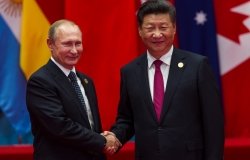Making Sense of the Multiple Conflicts in Nepal: Is There A Way Forward?
Mahendra Lawoti, assistant professor, Western Michigan University; Prakash Chandra Lohani, former finance minister, Nepal; Susan Hangen, assistant professor, Ramapo College of New Jersey. Video for this event is now available.
Overview
Three experts discussed Nepal's chaotic political situation at an event sponsored by the Asia Program and the Washington DC office of the East-West Center. King Gyanendra, who seized absolute power in February, has been unable to defeat the Maoist insurgency, which maintains control of much of the country.
According to Prakash Chandra Lohani, former minister of finance, insurgents have thrown the country into turmoil by killing people and driving farmers from their homes. Foreign investment has dried up, and investment of any kind in the countryside has declined precipitously. Democratic and economic liberalization, initiated amid high hopes by the late King Birendra, has collapsed. Maoists extort money from the population and, when anyone interferes with their activities, slip safely across the open border with India, Lohani explained.
What can be done? Lohani called on the king to end his "experiment" in direct rule, to respect the constitution, and to become a constitutional monarch. The king and political parties ought to be natural allies—lack of trust between them allows Maoists to win ground by appealing to the people. The different organs of state must share power and work together; otherwise Nepal will fall into an "abyss of despair and destruction."
Can anyone convince the king to give up absolute power? According to Mahendra Lawoti, pressure from the international community is crucial. Also important are more effective political mobilization and demonstrations. To lead and encourage such mobilization, however, the political parties must work harder to win support, Lawoti maintained. The parliament has discredited itself through nepotism and "lack of sincerity" in solving problems. Judiciary reform, land reform, and decentralization of power are also necessary for Nepal's political development, he added.
However, any political system that involves the current king will find it difficult, if not impossible, to regain the trust of Nepal's more than 61 ethnic groups, argued Susan Hangen. Ethnic groups do not want to secede, but they want support for their languages and cultures, and greater political participation. Although the Maoist movement is a class-based (not ethnic) movement, the exclusion of ethnic parties from the formal political system helped the Maoists to gain steam, Hangen contended.
According to Hangen, ethnic groups are deeply resentful of the domination of powerful positions by high-caste Hindus, and many do not want Nepal to be "a Hindu state." However, these groups find it difficult to agree on what strategy to follow—even within a single village.
Drafted by Amy McCreedy Thernstrom, Asia Program Associate
Robert M. Hathaway, Director, Asia Program, Ph: (202) 691-4020
Hosted By

Indo-Pacific Program
The Indo-Pacific Program promotes policy debate and intellectual discussions on US interests in the Asia-Pacific as well as political, economic, security, and social issues relating to the world’s most populous and economically dynamic region. Read more
Thank you for your interest in this event. Please send any feedback or questions to our Events staff.










